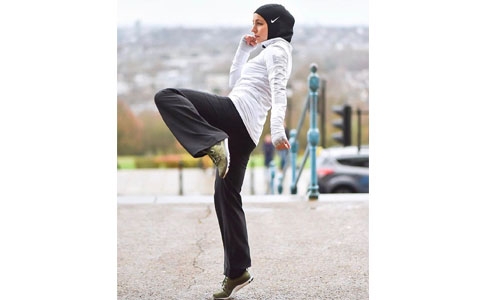The best time to work out during Ramadan, according to a trainer
TDT | Manama
The Daily Tribune – www.newsofbahrain.com
For those trying to maintain their workout routine while fasting amid the month of Ramadan, Nesrine Dally - a British Nike trainer, NASM performance enhancement specialist and corrective exercise specialist, and Muay Thai boxer - shared that it may require a shift in your schedule.
Dally says in the video seen above that though it depends on your personal preference, she recommends training one to three hours before iftar so you’re able to rehydrate and refuel post-workout. Dally prefers to work out an hour or two pre-iftar. She told POPSUGAR that her body has become accustomed to it.
“I’m aware of my limits and how to control the volume and intensity of my sessions,” she said. If you do have to train after iftar, she suggests breaking your fast with a small meal (such as water, dates, and a good source of protein and carbs) to keep you energized for your workout. Then, you can continue to hydrate and eat a big meal once your sweat session is done.
Training too early in the day, Dally says in her video, might leave you feeling slightly dehydrated and low on energy, which is why she advises against exercising in the morning or around lunchtime. But if this is something you’re used to, that’s OK, she adds. As she points out, our bodies are all different. Dally told POPSUGAR that it’s helpful to think about Ramadan training as maintenance. In an interview with British Vogue last year, she explained that this means keeping up a “good level of base strength, conditioning and moderate aerobic training.”
She also told the outlet that if you’re exercising before iftar, focusing on sessions that are shorter and low-impact and involve bodyweight moves or use light weights are ideal.
Dally told POPSUGAR she suggests prioritizing strength training during Ramadan because it’s “the best way to reduce muscle loss during the month, maintain a good level of strength, and keep the body resilient and ready to resume your schedule post-Ramadan.”
Training too early in the day, Dally says in her video, might leave you feeling slightly dehydrated and low on energy, which is why she advises against exercising in the morning or around lunchtime. But if this is something you’re used to, that’s OK, she adds. As she points out, our bodies are all different. Dally told POPSUGAR that it’s helpful to think about Ramadan training as maintenance. In an interview with British Vogue last year, she explained that this means keeping up a “good level of base strength, conditioning and moderate aerobic training.”
She also told the outlet that if you’re exercising before iftar, focusing on sessions that are shorter and low-impact and involve bodyweight moves or use light weights are ideal.
Dally told POPSUGAR she suggests prioritizing strength training during Ramadan because it’s “the best way to reduce muscle loss during the month, maintain a good level of strength, and keep the body resilient and ready to resume your schedule post-Ramadan.”
Related Posts


